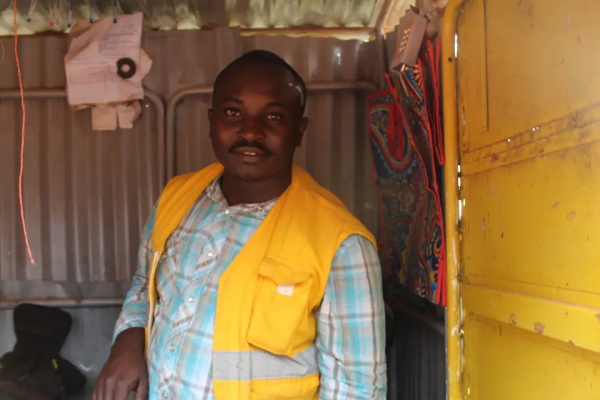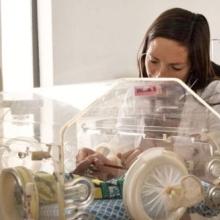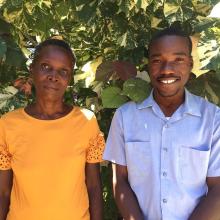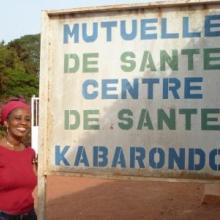One morning in July 2014, Bizinde Elyse noticed that his right knee was painful and swollen.
A native of Nyamasheke District in Rwanda’s Western Province, Elyse brushed it off, assuming he had played football too roughly with friends at school and the swelling soon would go down. To his alarm, his knee kept swelling over the next few days, while becoming itchy and hot to the touch. His parents grew concerned and urged him to go to the nearest health center. He was about 20 years old at the time.
At the health center, clinicians could not immediately diagnose the swelling’s cause. They gave Elyse some medicine and told him to come back in a few weeks. But his condition continued to worsen, as the swelling increased considerably and he became feverish. Elyse quickly went back to the health center, well before the few weeks were up, but clinicians again could not give conclusive results. They referred Elyse to the district hospital, which promptly referred him to University Teaching Hospital of Butare, in southern Rwanda. Butare is more than 100 miles—or three-plus hours, by car—from his home district.
Doctors at the teaching hospital diagnosed Elyse with rhabdomyosarcoma, an aggressive and highly malignant form of cancer in skeletal muscle cells.
Elyse remembers feeling shell-shocked.
“I had always heard of cancer affecting other people, and I never thought I would ever be one of those people,” he said. “It felt like the end of the road for me. I was even more sad because my parents took it very hard. My mother was very distraught. I hated seeing her that way and it added to my own sadness.”
Fortunately, doctors told him that since they had discovered the cancer in its early stages, it was still operable. They recommended a swift course of action, beginning with amputation to stop the cancer from spreading. Surgeons amputated Elyse’s right leg in early 2015. Following that surgery, doctors transferred Elyse to Butaro District Hospital in northern Rwanda, for chemotherapy. The Butaro hospital and its Cancer Center of Excellence are supported by Partners In Health Canada, known in Rwanda as Inshuti Mu Buzima.
Elyse said the compassion of Butaro staff was as important to his full recovery as the treatment.
“Everyone was really kind to me. It made me feel less lonely, as I had made the journey from Nyamasheke to Burera (District) alone, without my parents,” he said. “My treatment, lodging, and meals were all covered by Partners in Health. I would also get transportation from where I was staying to the cancer center, for treatment, and had access to counseling services, which I received regularly.”
Partners In Health also provided Elyse with a prosthetic leg, so he could transition from using crutches.
Today, Elyse is 25 years old, healthy and cancer-free. He decided to move to Butaro permanently to make checkups easier, and now runs a small variety shop near the cancer center. He sells everything from airtime data and mobile money transfers to small snacks and everyday items.
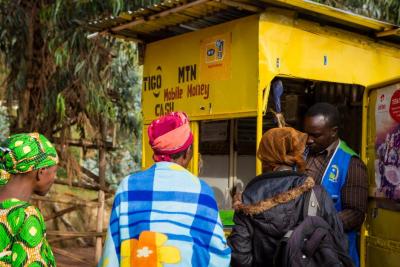
Bizinde Elyse, who had one of his legs amputated as part of his treatment for cancer found in his knee, has become a healthy, familiar face in the Butaro community in northern Rwanda. Here, he helps customers at his small stand in March 2017.
Cecille Joan Avila / Partners In Health
His customers range from caregivers to first-time visitors to the Butaro hospital. He speaks gently as he serves his customers, and has become a beloved, familiar member of the community.
“If you could have asked me two years ago what I would be doing now, I would not even have told you—I would’ve assumed I’d be dead,” Elyse said. “Now, I am an entrepreneur and am contributing to my community and my country.”
Elyse added that he is incredibly grateful for his recovery and new outlook on life. He also is able to think about his future. In 2017, Elyse graduated from high school, earning second-class honors in math, biology and chemistry. He said he hopes to be a doctor one day, so he can help people in the same way he was helped.
“I would like to thank everyone who helped me get better, from the doctors, nurses and care providers at Butaro, and the government of Rwanda, to Partners in Health, who covered the cost of my medication and also supported me with a prosthetic leg,” he said. “I have been able to go back to my normal life because of their intervention and support.”
